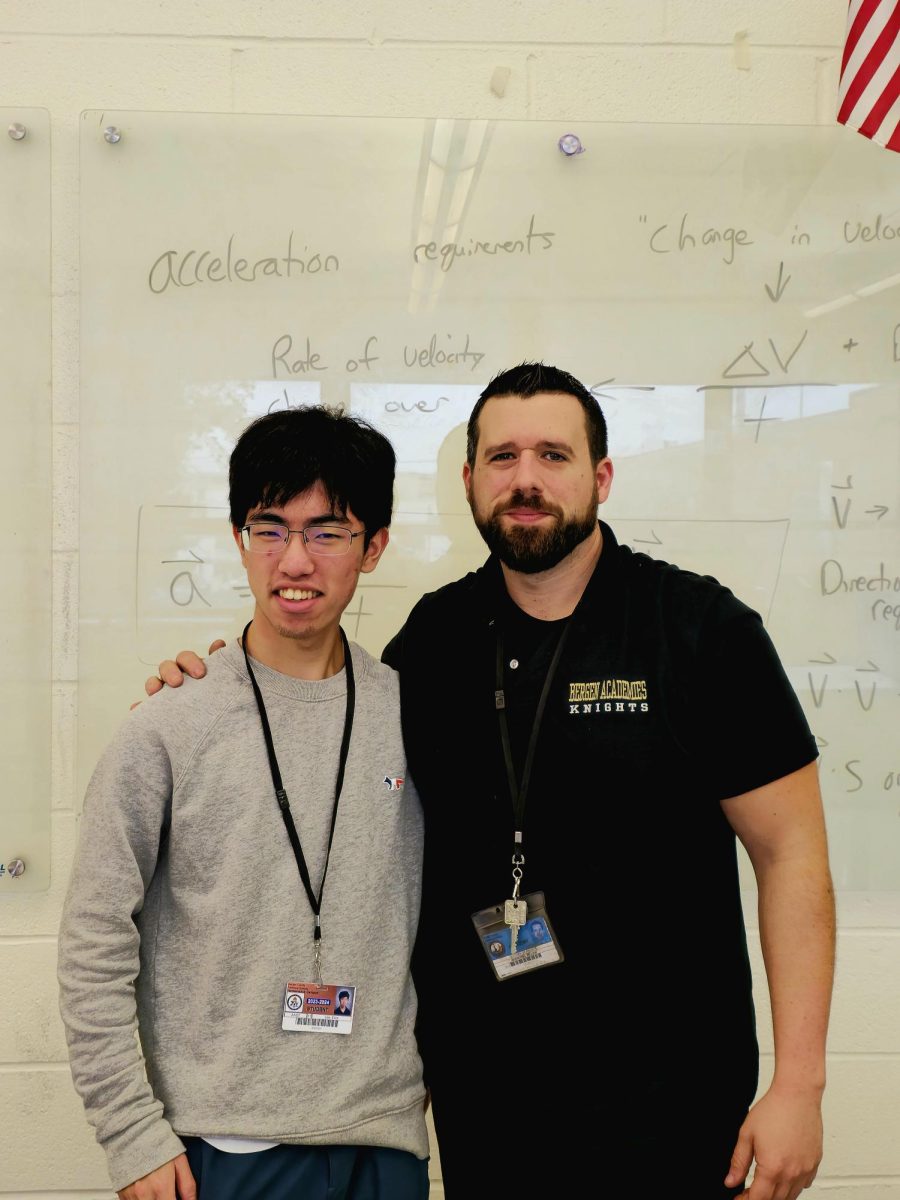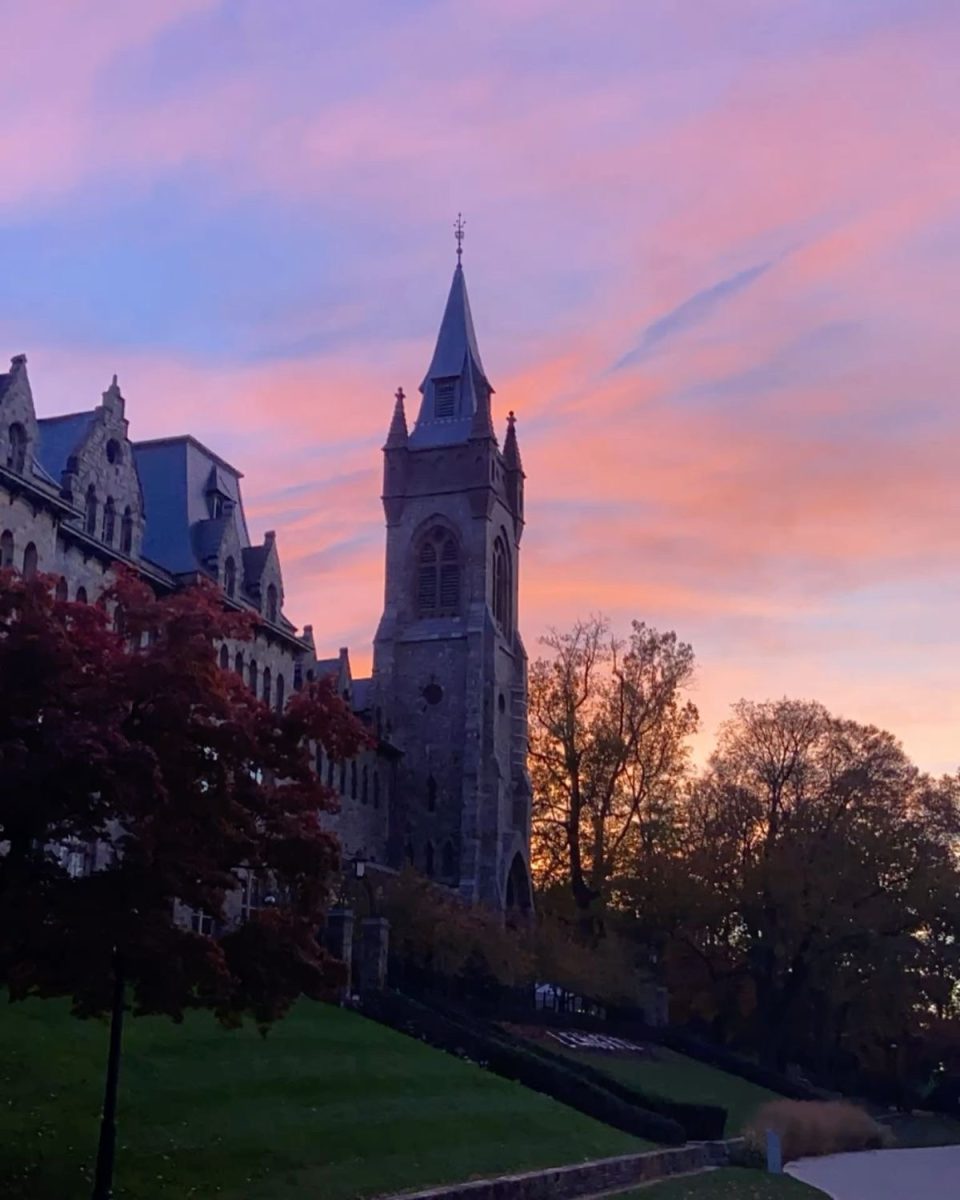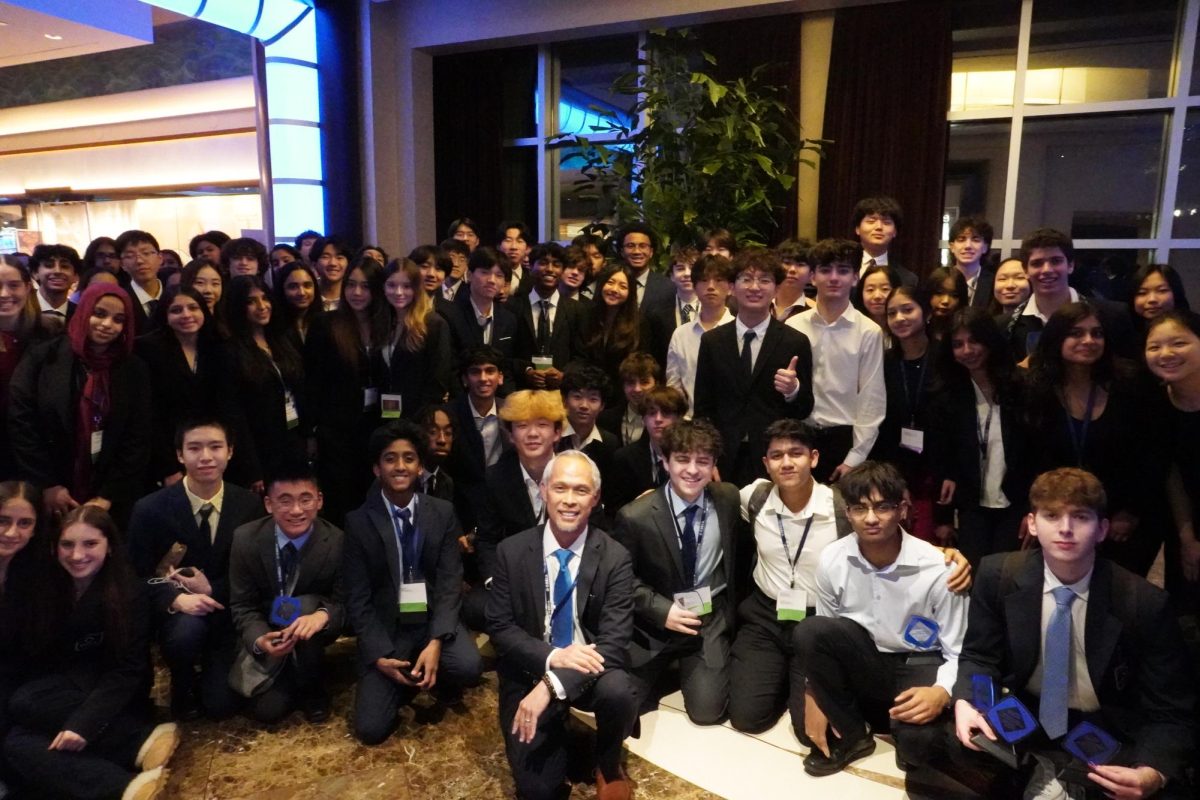Mr. Hodroski is a physics teacher who has been at Bergen County Academies for three years. In total, Mr. Hodroski has taught for 12 years in the education field. Mr. Hodroski is responsible for teaching the first year of physics for all academies and electives such as Automotive Dynamics and Engineering. Within this first year of physics, students typically go over Mechanics and early Field unit material.
More recently, Mr. Hodroski has taken up administrative roles in terms of safety within the BCA school building. This was announced in an assembly on September 11th regarding said safety. In this assembly, Mr. Hodroski presented, in cooperation with Mrs. Mendelsohn, the bolstered reinforcement of previous BCA rules regarding entry doors and IDs. In order to gain more insight into Mr. Hodroski’s motivations and his involvement within the school, the Academy Chronicle conducted an interview with him.
AC: Can you tell us a bit about yourself and what you do?
Mr. H: Well, I am a physics teacher here at BCA. I teach physics and engineering, and one of my new roles here is going to be a lead teacher, which is going to extend into next year as well. This is my eleventh year teaching, I’ve been at a few different school districts, and honestly, I am really happy that I have had the opportunity to come here to BCA. It’s a very unique school, and I’m looking forward to all the opportunities I will have in the future here.
AC: Can you elaborate on what a Lead Teacher is?
Mr. H: So, a lead teacher at a high school gives us a little bit more authority to act in administrative roles when necessary. We basically help administration with students, some disciplinary actions, scheduling, and other things like that.
AC: So what do you like to do in your free time?
Mr. H: In my free time, I love playing with cars, definitely a self defined “gearhead,” which is why I have all of these automotive things here at the highschool and in the makerspace. I have always been engineering and physics inclined – I like to take things apart and see how they work. Since my father was very much into cars and trucks, I happened to follow that. I guess I inherited it to a certain degree. Besides that, I love woodworking and working on my house when I have the opportunity. In college, I transitioned away from sports and I spent a little bit of more time on competitive weight lifting. So I still do that to a certain degree, but not as much as I used to in my younger days.
AC: Speaking of your education, how did you get interested in physics? Does it have to do with your interest in cars?
Mr. H: I think physics really came around from my father who was a mechanical engineer. I also do have a few physicists in the family. Previously, I was thinking of going into engineering. My father, who had a mechanical engineering degree from Rutgers, thinking of the way my mindset worked and my personality worked, thought that I might not like the engineering field. So, he kind of steered me towards physics, and then education kind of came along with that. I had the opportunity to come into the field as a physicist, but potentially if I continued those studies, I could go a bit more into mechanical engineering, or pursue teaching. When I was in college during my junior and senior years and I started teaching in actual schools, I just fell in love with it, and I am very happy that I can continue to pursue that.
AC: So your interest in teaching coincided with your interest in physics?
Mr. H: Yeah, I think that to a certain degree, I had an interest in physics and engineering. There was somewhat of a push from my father to get a degree in education as well, and then they just happened to have a very nice marriage together. I don’t regret it at all; I don’t regret not going into physics or engineering in terms of an actual field/job. I really do like education; I really like working with my students every single day, and those students who have had me can probably see that engagement and interest on a daily basis.
AC: What would you say is your favorite aspect of physics or your favorite topic to cover within physics?
Mr. H: If you are at BCA, I basically teach introductory physics and it could all be summed up as Mechanics, or Newtonian mechanics, which includes Forces, Kinematics, Energy, Momentum, and Impulse. Personally, I like those topics in physics because they are very realistic in terms of everyday life. They can be connected to everyday motions such as sports, driving, and other matter that you interact with in your daily life. This allows me to connect to students of all skill levels, from a very high level to a very low level. Those topics are very interesting to me, and I know I can steer them in directions that would make sense to students. This allows me to be involved in their interests as well.
AC: So with that context, would you say you prefer more of the physical side of physics compared to the theoretical side?
Mr. H: Oh yeah I would definitely agree with that, I like the tangible things that you can actually see, register, and measure, such as the concept of momentum and friction, something that you can actually quantify and see in real life compared to something more magnetism based or quantum based.
AC: So how is your current experience teaching in BCA?
Mr. H: BCA is definitely a very special place; it is something that has really rejuvenated me as a teacher. This is now my 11th year teaching. I definitely thought a few years ago that I might pursue going into a more administrative role, or maybe even teaching college level as well. BCA is such an amazing blend between a typical high school setting but with all these opportunities that are presented to you and us as faculty, which makes it really college-esque in terms of research, projects, electives, and all of this flexibility to offer opportunities. I absolutely love it. I think some of the students that go here don’t necessarily realize how special this place actually is until they go and talk to somebody from a different high school. Definitely the wide breath of opportunities here makes this place special as a faculty member and teacher, so I try to take advantage of them whenever I can.
AC: Is there anything about teaching at BCA that stands out to you?
Mr. H: The fact is that BCA is constantly evolving: there are always new electives being offered, and there are always new projects. A student who has an interest one year and a different interest another year can transition from their old interest to their new interest and can choose different electives and different projects and different research topics as they grow as a learner and as a person as well. Those are the things that kind of set this place apart, it’s a very great place for those opportunities where you can really learn to be a learner and to be a student as well.
AC: Do you believe that teaching physics to students is important?
Mr. H: Yeah, I think that Physics is absolutely fundamental in terms of something that should be taught. Especially the Mechanics version of physics, because it just helps you understand the everyday life aspects of matter around you. Whether that is driving, walking, or competing in a sport. One class that I have had here is junior mixed academy students, and I try to really focus a lot on my physics concepts around driving. It’s always surprising to me how students’ eyes open up when we talk about friction and driving on asphalt, concrete, inclement weather, or driving on a nice sunny day. And just having that background in your mind of how when you are driving in snow, you have less friction available between the tires and the snow, and we have to change our driving style to be more safe. Just having those physics concepts in the back of your mind and being able to work with them on a daily basis makes your life easier, your life potentially more safe, and it’s something that we should all know as members of a functioning and safe society.
The Academy Chronicle thanks Mr. Hodroski for taking the time to sit down for this interview. This interview has helped our readers gain special insight into Mr. Hodroski’s perspective on Physics as well as clarify his involvement within the school environment.






